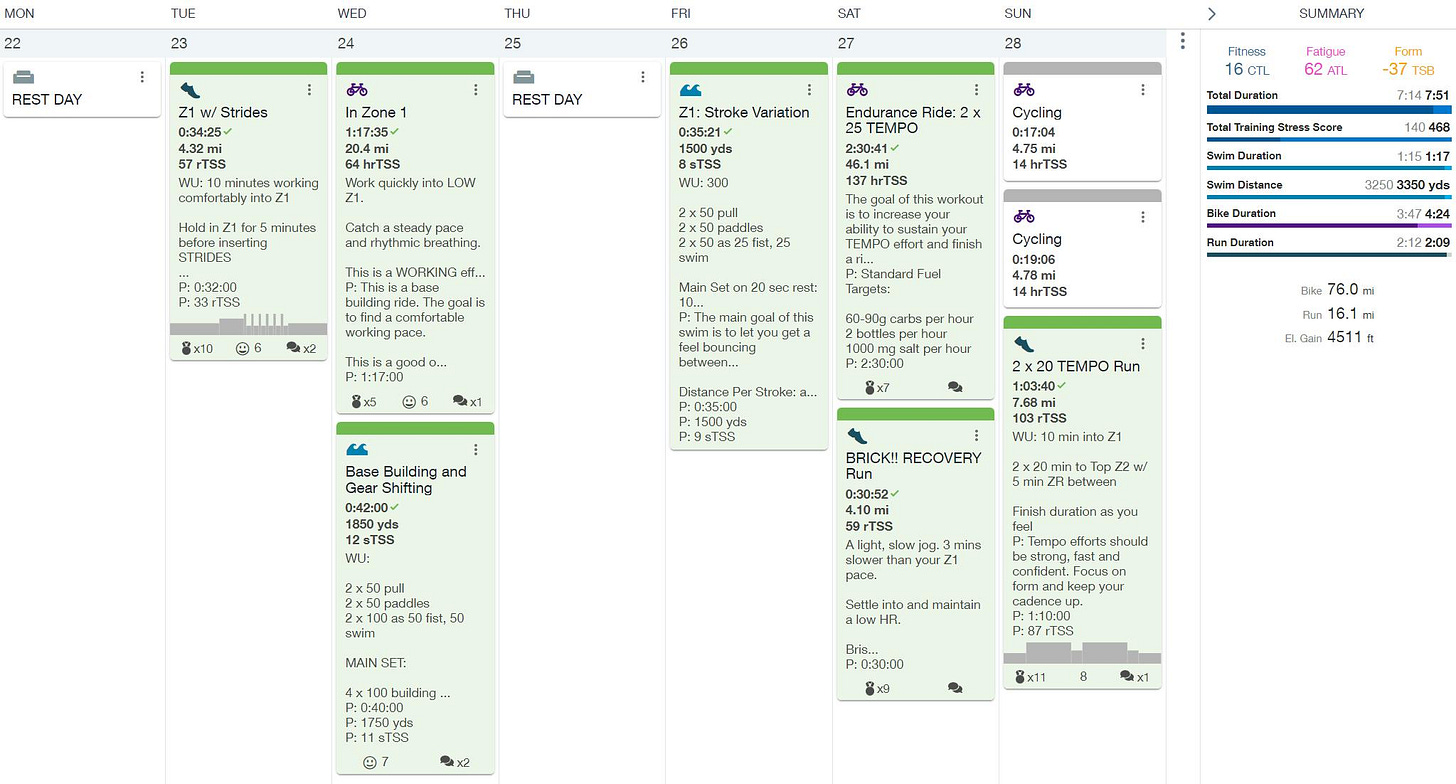Being an endurance athlete really isn't about becoming a hermit and doing nothing but training all the time.
It's about staying on top of your schedule and getting consistent reps. It's about having clear time blocks for training that are easy to execute on, so you're not stressed out about it all the time.
I call this playing life on offense.
Playing offense is about organizing yourself and your life in ways that support your goals - not hoping life makes space for you to squeeze something in at the end of the day.
My athlete Rien is a perfect example of how to implement this.
But only because something went sideways first...
Rien joined Tribal on a fast track program to his first 70.3.
And his first week of training was rock solid. He didn't miss a single session.
But once the initial excitement wore off, something shifted.
He missed almost every workout in Week 2.
We had a check-in chat and I asked how he was feeling.
He said life was wearing him down.
he had a family outing 2 hours away
the next day his friends invited him to a soccer game
and then work got crazy and he had to stay late a few nights in a row
Meanwhile, his training took a back seat to everything. And he lost all momentum.
He was hoping to piece in sessions after his other commitments. But nothing was getting done
And he felt behind on everything.
I had to get real with him...
I told him that he was stuck playing life on defense.
He was:
not prepping his training gear the night before
starting each day without a plan for when to train
saying "yes" to whatever life threw at him during the day
And then hoping that training for his first half Ironman was going to magically happen.
This is the recipe for burnout. And I see guys struggle with this all the time.
Then they:
make excuses
say endurance takes too much time
convince themselves they have to give up everything else in life to do a 70.3 or Ironman
I'm going to show you how Rien turned everything around by playing life on offense.
Let's go!
Tactical Coaching Tips:
Step 1: Know Your Workouts For The Week
On Sunday night, look at your training for the upcoming week.
But what you do next is even more important...
Communicate with your spouse/family when you will be training.
My athlete (and Tribal Assistant Coach) Brandon Littrell is a perfect example of this:
Brandon is a husband, father of 4 and owns his own construction biz.
Oh... and he just spent the last 2 years building his family's new home with his bare hands.
He's also an Ironman, ultramarathon runner and just took down his second 70.3 of the year.
This is how he makes it all work.
Step 2: "Backwards Plan" Your Workout Time Slots
This starts by understanding what constraints you have in your life.
Family time, work, church, social obligations, etc.
Then piecing training around those.
Here are some real life examples from athletes inside Tribal:
kids get up at 7 am during the week, so he gets up at 5 and finishes training before then
local pool is only open for lap swimming during the week from 5 to 7 am, so that's when he swims
has to leave for work by 8 am, so he gets up at 6, finishes training by 7:30 and has time to get ready before leaving at 8
has a social event at noon on a Saturday and has a 3 hour ride on the plan, so he gets up early and rides before the event
Did you noticed something in those examples?
The solution in all of them did 2 things:
clarified when an athlete was needed somewhere in life
then "backwards planned" to get training done before then
That is by far the most successful strategy (especially for parents).
A key part of playing life on offense is taking initiative, being proactive and creating space for your personal goals to fit in your life.
Step 3: Prep Gear The Night Before
This is all about removing decision making and making it easy to start.
Swims: write our your swim set, put swim bag with bathing suit and towel on the kitchen table
Runs: lay out gear (shoes, socks, shorts, HR chest strap) and prep fuel bottle (more on fueling later in the course)
Rides: make sure your bike is on the trainer if you're riding inside, lay out gear (bike shorts, shoes, HR chest strap, towel) and prep fuel bottle
Pro Tip: it's helpful if all your gear has a "home"
Keep your gear in it's spot and put it away right after training.
This makes it super easy to get started when the next session comes around.
Rien followed this playbook to a T, reclaimed momentum and crossed the finish line of his first 70.3.
Here's a pic of Rien and another Tribal athlete (Big Mike) after Waco 70.3.
There you have it - the formula to playing life on offense.
This email is Lesson 2 of a 5 part educational email course on Mastering Endurance Training.
To get the rest of the course for free, CLICK HERE.
Or click this button.







